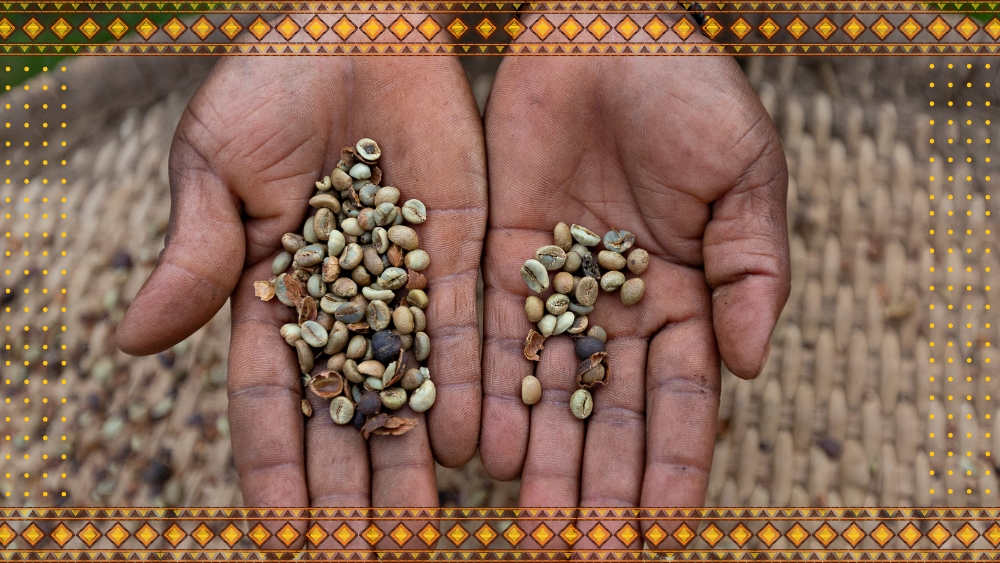
On a red-soiled coffee plantation some 170 miles northeast of Uganda’s capital city of Kampala, a young woman sorts coffee beans headed for a Trader Joe’s in Milwaukee.
Endiro Coffee, a collective coffee firm made up of 518 Ugandan women in the mountainous Mbale region of eastern Uganda, just struck a deal with the U.S.-based grocery retailer to deliver whole coffee beans to its Midwestern stores through Chicago. The company, which was founded in 2011, is one of thousands of groups among 93 coffee growing districts in Uganda that are rapidly growing their bean production to claim their place in the global coffee market.
Ugandan coffee farmers are not yet competing with established coffee-producers Brazil and Columbia, but rather their own neighbors: Kenya, Rwanda, and Ethiopia. These East African countries have been cultivating coffee for much longer than Uganda, especially in Ethiopia, the birthplace of coffee, and therefore have created stabile supply chains and sizeable market share. To compete, Ugandan coffee producers are dedicated to exporting coffee the right way throughout the entire process: from the initial harvest to the overseas shipment.
The first focus is on perfecting the quality of the bean. This stems from proper training of local farmers, many of whom have informally learned the process from their parents growing up. Like other coffee collectives across Uganda, Endiro passes on technical horticulture knowledge to local farmers, teaching them to identify the perfect time to pick coffee cherries and the most efficient methods of storing them.
“Quality is key. If you don’t meet the standard, the team leader has the right to reject [their coffee beans],”said Mily Drijaru, the quality control operator of Endiro Coffee.
It’s also essential for farmers to test their product and know how to identify quality. Historically, Ugandans have not been big coffee drinkers themselves, as coffee was seen as a luxury. To promote the growing coffee-drinking culture among farmers and locals, Endiro Coffee has opened 12 coffee bars across Uganda that features lattes, frappes, and specialty brews.
The Uganda Coffee Development Authority is a specialized government program that has allocated funding for training and equipment for local farms. The value of Uganda’s coffee exports has grown from $540 million in 2020 to $837 million in 2021, a growth rate of 55 percent. The crop is seen as a top priority for the Ugandan government as well as the private sector.
“Right now, Uganda’s exports are $6 billion per year. The target goal is to grow exports to $12 billion per year by 2027,” said Roland Nkahebwa, head of digital communications at the Presidential Advisory Committee on Exports and Industry development.
“Coffee is one of the few agricultural crops that is grown country wide. It is one of the major cash crops, so it has the potential to become a major export,” said Nkahebwa. “There is also an apprenticeship program for farmers to get more farmers across the country to get more involved in commercial farming.”
Mountain Harvest Coffee is a collaborative for-profit firm that works with 36 groups of farmers on Mount Elgon, an extinct volcano that sits near 14,000 feet above sea level near the Kenyan border. The groups are each made up of roughly 30 farmers from various small farms on the mountain, averaging 1 acre of land each. The firm´s goal is for each farmer to have 2.5 acres of land, the size needed to reach profitability.
“You have to up the quality to the 90s, like Ethiopia, to command prices that are more than double the market price,” said Kenneth Barigye, managing director of Mountain Harvest. “The second alternative is to diversity income, to have multiple streams of income using the same small garden that they have.”
One of the biggest incentives for local farmers to work with Mountain Harvest is to gain access to micro financing, a nontraditional alternative for low-income farmers who aren’t yet approved for official bank loans. As a working-capital loan, the firm provides farmers with sustainable crops for them to begin planting produce during coffee’s off season [between July and August and December through February]. Now Mountain Harvest’s farmers are growing avocados, bananas, macadamia nuts, and legumes, along with raising rabbits and cows for fertilizer.
Aside from quality of the bean, reputation and marketing is also essential to do business on a larger scale, especially with the advanced coffee markets in the U.S. and U.K. Mountain Harvest sent local farmer-turned-barista Ibra Kiganda to the 2023 African Barista Championship in February – Kiganda came away with the top prize.
Now that he’s achieved the title of best barista on the African continent, Ibra is heading to Athens to put Uganda on the map at the Word Coffee Championships in June.
Source: Published without changes from Zenger News







